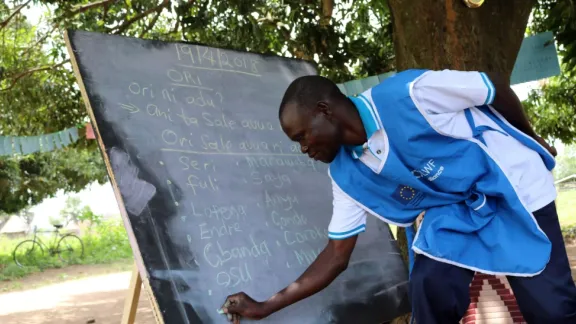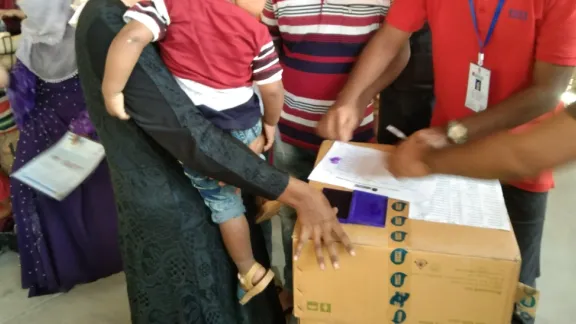What We Do
World Service’s protection and social cohesion goal is to enable individuals and communities to live safe, dignified, and empowered lives, free from all forms of discrimination, abuse, and exploitation.
In all contexts and programs, the ultimate goal is achieved when people’s rights are fulfilled and protected, and when both individuals and communities are able to thrive.



People will be better protected when they feel more capable and less vulnerable to threats to their wellbeing and livelihoods, and when local capacities for cohesion are strengthened.
We believe that the people we work with are themselves the principal actors in their own protection. Our role as an external actor should first and foremost be to identify and build upon existing capacities and initiatives for self-help, protection and social cohesion.
We carry out protection risk assessments to inform the design of specific protection assistance, together with protection mainstreaming in all of our programs. We partner with rights-holders, civil society, authorities, and UN agencies to protect, respect, and fulfill the fundamental human rights prioritized by the communities we work with. This approach directly links protection activities and initiatives with those related to quality services and livelihoods.
Our work on protection prioritizes the rights of the most vulnerable individuals, families, and communities, supporting them to secure their rights to humanitarian assistance, and freedom from discrimination, minimizing the likelihood of sexual and gender-based violence, other gender injustices, and child exploitation and abuse. We provide psychosocial support to people experiencing trauma, always referring those who need more specialized care to an appropriate service provider.
Ensuring compliance with the Core Humanitarian Standard in all programs is a requirement for enhanced accountability toward the people with whom we work.
World Service intentionally identifies and builds upon people’s and communities’ own capacities and initiatives for self-protection, cohesion and development based on the conviction that they are best placed to protect themselves. We anchor our programs on increasing community participation, strengthening community management structures and building community protection and cohesion systems. Special protection measures target the most vulnerable groups and communities, as needed. We recognize and promote the proactive and positive engagement of faith communities in this work, in order to reinforce inclusive social values and actions to protect the most vulnerable.
The bulk of our work in this programmatic area focuses on the community level as this promises more protection benefits for individuals collectively. We engage in building social cohesion and peaceful co-existence in the communities that we work, ensuring that initiatives are linked to appropriate government plans.
As a proactive means of protecting vulnerable individuals, families, and communities, we help build protective community-based structures and networks with a particular focus on child protection, the participation of children and young people, women’s empowerment and gender justice, land rights, civil society strengthening, and disaster preparedness.
Building on the trust, legitimacy, and evidence gathered through our close relationship with communities, LWF actively lobbies and advocates for institutional strengthening and enforcement of protection frameworks at local, national, regional, and global levels. We facilitate local efforts to establish inclusive, protective, and non-discriminatory policies, laws (including family and customary laws and norms), structures, and systems. We also collaborate with others to find and implement durable solutions for individuals, families, and communities. Notably, we will promote the uptake and implementation of guidelines on faith-sensitive psychosocial programming within the humanitarian sector.
Taking institutional engagement from the local to the national and international levels, and working in the area of rights more generally, we position ourselves as an enabling actor in civil society, working with others to promote the rights of the people with whom we work. World Service enables their voices to be heard in national and regional forums, and also at the international level, empowering them to secure commitments for better protection, social cohesion and development from duty-bearers. The implementation of these commitments is monitored through our engagement at the national level.
Contact
Get Involved
Share with us your stories, photographs and insights using the #LWF
